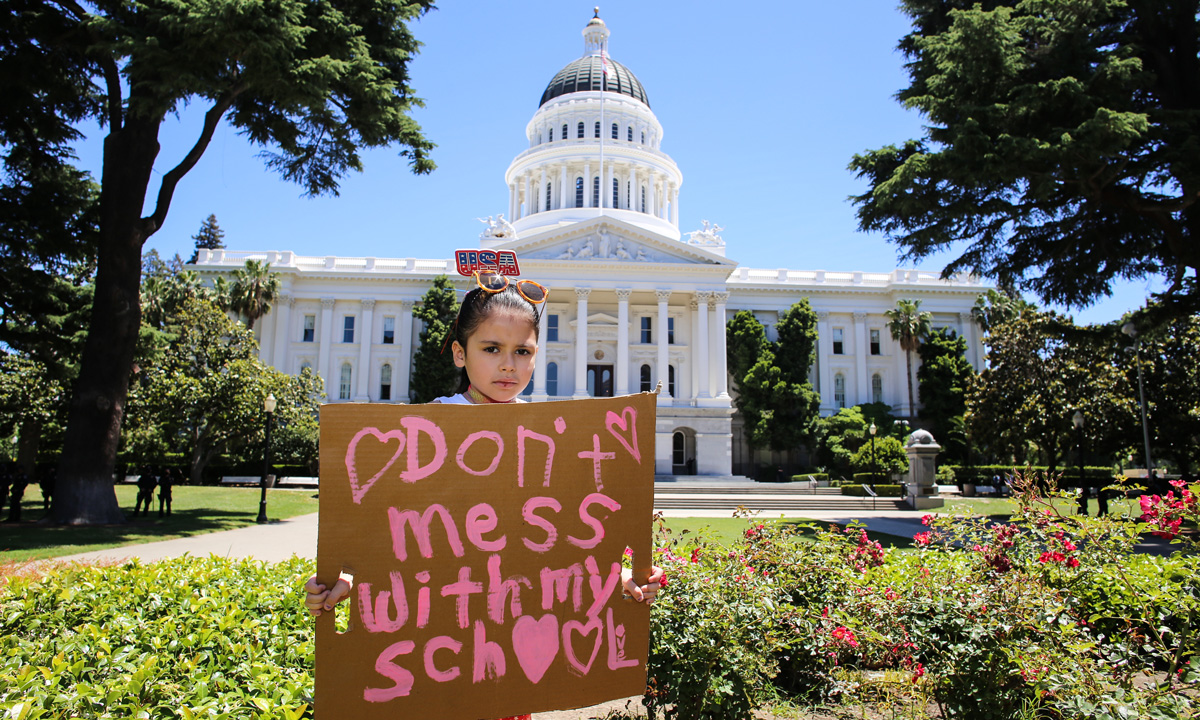Settling Lawsuit, California Agrees to Channel $2 Billion to Struggling Learners
In agreement to end 2020 litigation, the state will pull from existing funds to reach students who fell behind during COVID-era remote learning.

Get stories like this delivered straight to your inbox. Sign up for The 74 Newsletter
California will specially designate at least $2 billion to spend on learning recovery for disadvantaged students who fell behind during the pandemic, according to a legal settlement reached last week.
The agreement — which will not require the state to raise or spend new revenues — serves as a partial validation of complaints from thousands of families around the state who said their children received inadequate assistance after state and local authorities closed schools in 2020 and 2021. But it is also an attempt to square California’s financial commitments to students with a $32 billion budget deficit facing lawmakers this year.
Going forward, school districts will receive money in proportion to their respective enrollments of high-needs populations such as low-income students, English learners and foster children. As part of the settlement, state legislators will direct schools and districts to spend the funding on interventions with previous records of success, such as in-school tutoring.
Ben Austin, an attorney and founder of the nonprofit group Education Civil Rights Now, described the deal as “necessary, but far from sufficient.”

“This settlement is not a wholesale solution but an important step in the right direction to remedy this historic injustice for an entire generation of children,” Austin wrote in an email. “It includes funding and basic accountability measures tied to outcomes for kids.”
In a statement provided to the Los Angeles Times, a spokesman for the California State Board of Education called the details of the agreement “appropriate” and said the state appreciated “the collaborative approach and the insights that plaintiffs offered.”
Filed in 2020, Cayla J. vs. the State of California charged state officials with bungling the transition to remote learning and subsequently failing to mitigate the learning loss that resulted. Fifteen students across Oakland and Los Angeles, along with a pair of community organizations, originally brought the case against the state superintendent, the state board and the California Department of Education.
Several plaintiffs said they received only a handful of days of live teaching after their schools were shuttered in the spring of 2020. That fall, many school days consisted of less than two hours of instruction split up in the morning and afternoon. Even in households that received district-provided laptops and tablets, access to high-speed internet was sometimes so poor that very little schooling actually took place during those months.
Among the effects was a pronounced downturn in student achievement as measured through standardized test scores. Recently released data from the Education Recovery Scorecard, a research partnership between social scientists at Harvard and Stanford, shows that even four years after the emergence of COVID-19, many California students still lag far behind grade level on assessments of math and reading skills.
Reflecting the fierce disputes over COVID-era shutdowns, and the enormity of the task ahead for educators and policymakers, responses to the settlement from education observers across the state were mixed, ranging from optimism to disappointment.

Lance Christensen, the Republican nominee for state superintendent in 2022, called it “significant” that the students most harmed by the academic disruptions of the last few years would receive additional resources. But the bumpy road to Zoom classrooms was damaging for students throughout the state, he said, and not just those in struggling districts like Oakland.
“It ignores the fact that most of the districts they’re focusing on — like Oakland Unified, where this originated — are some of the worst districts in the state, and throwing more money at them is not going to fix the problem,” added Christensen, who now serves as vice president for education policy at the right-leaning California Policy Center. “So I’m concerned that this will just be another payment plan for a broken system.”
The funds underwriting the targeted spending will come from an existing source, the state’s $7.9 billion Learning Recovery Block Grants initiative. Education advocates were alarmed last spring when Newsom proposed cutting $2.5 billion from that revenue stream as a response to California’s mounting budget shortfall. Amid a patchy return from pandemic-era restrictions on economic activity and a spurt of migration from the state since COVID, tax revenues fell significantly below projections in 2023, leading to expectations that more retrenchment will be required.
Ted Lempert, a former Democratic assemblyman and president of the advocacy organization Children Now, said he was encouraged by the settlement’s strict mandates on how the recovery money would be spent, but argued that much more was required to fully address learning loss.
“We’ll always take something, but we’re still really focused on that cut from last year being restored,” he said. “A lot of dollars were promised, and this settlement doesn’t guarantee that those dollars will be forthcoming.”
Lakisha Young struck a similar note of caution around the state’s fiscal constraints, but also said she regarded the agreement as a meaningful victory. Young is the CEO of Oakland REACH, one of the community organizations that signed onto Cayla J. as a plaintiff, and a frequent critic of inequities in the provision of educational services in California.
“Three years ago, our families would not have thought their voices mattered at a level to make this kind of impact — not only to impact their kids, but other folks’ kids across the state,” Young said. “Families and communities that have typically not had this type of agency, when they can get a win, it’s really a win for all of us.”
Get stories like these delivered straight to your inbox. Sign up for The 74 Newsletter

;)
